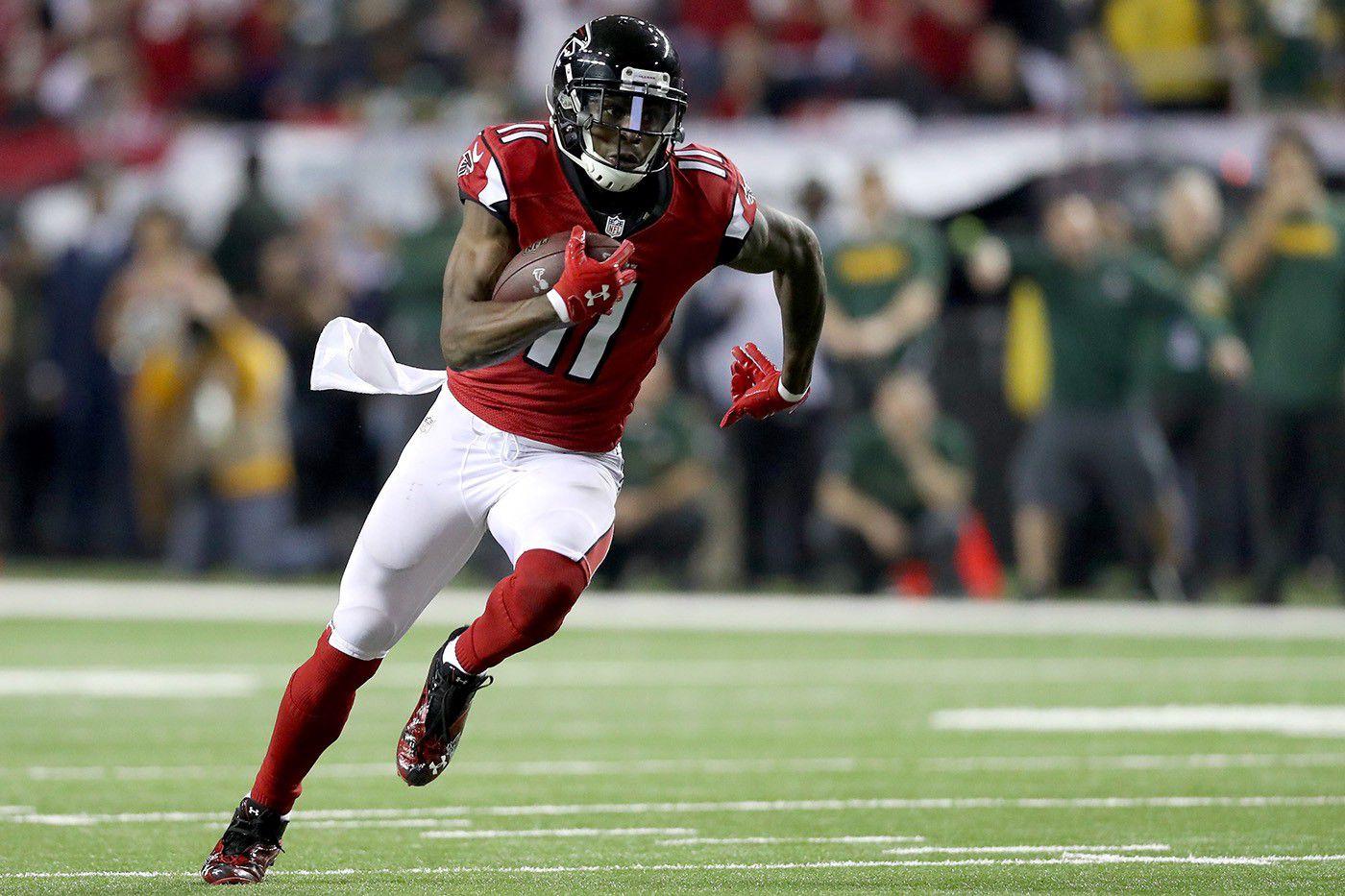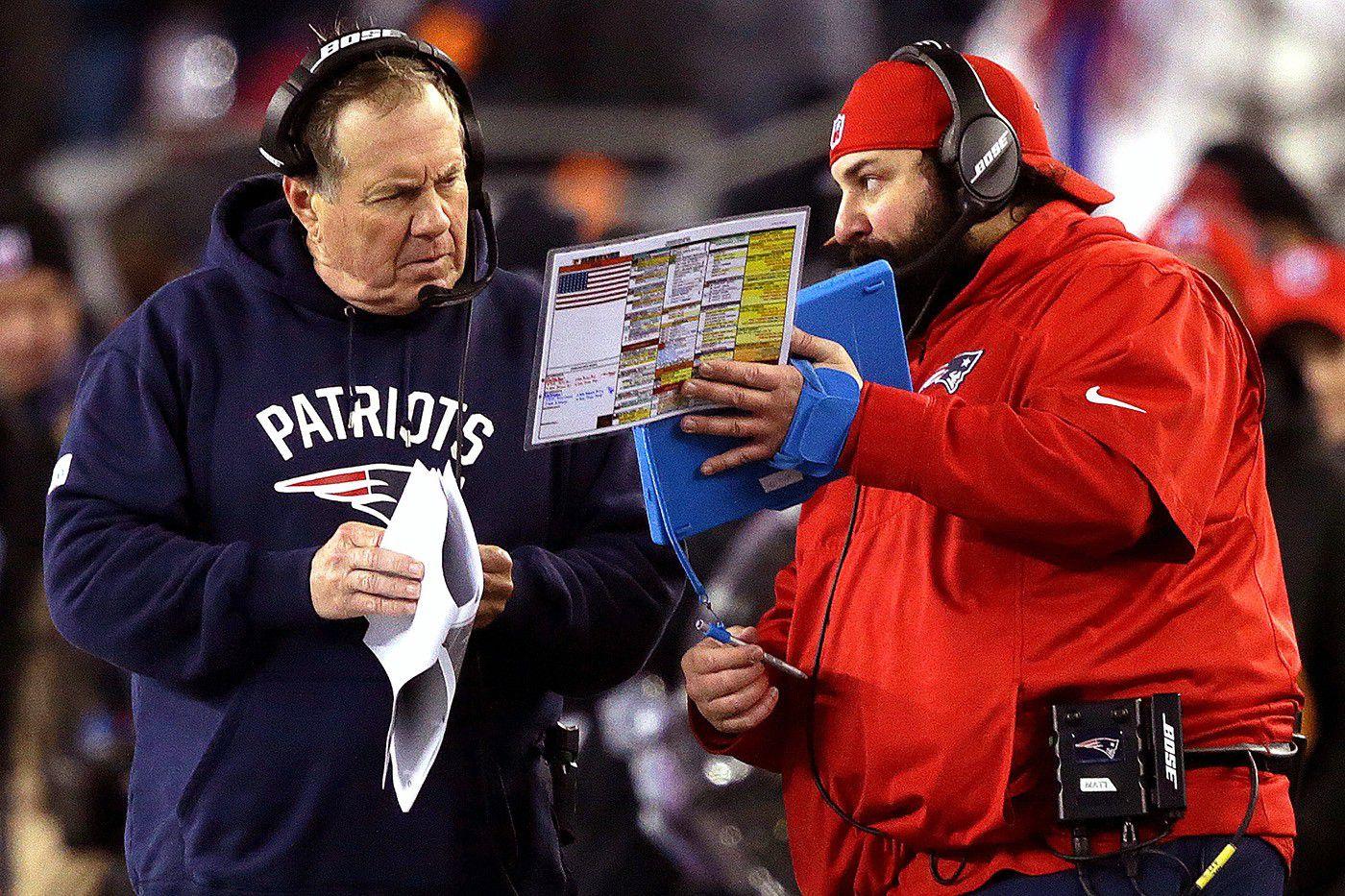When the New England Patriots and Atlanta Falcons meet in Houston this Sunday, each side will have benefited from two weeks of preparation. Both teams have ample talent, and the difference in skill levels is so thin that whichever team employs the superior strategy will likely be the one that prevails.
The game features the two most well-schemed teams in the NFL, leading Robert Mays and I to call it “matchup porn” on Wednesday’s Ringer NFL Show (though we’re not totally proud of that). Patriots head coach Bill Belichick is arguably the game’s premier strategic mind; this year, his offensive coordinator, Josh McDaniels, proved to be extraordinarily skillful at finding a team’s weakest link and exploiting it, while his defensive coordinator, Matt Patricia, deftly utilized a nucleus of highly versatile playmakers to build the league’s top scoring defense. Meanwhile, Falcons OC Kyle Shanahan bolstered an already impressive résumé by engineering one of the most efficient and prolific offensive attacks the league’s ever seen, while head coach and de facto defensive coordinator Dan Quinn molded an inexperienced defensive group into a playmaking, turnover-creating machine over the second half of the year.
There’s so much that goes into devising a strategy for this game, and while we certainly can’t offer Belichick’s Napoleonic mastery of game theory or Shanahan’s near-effortless ability to call the right play almost every time, we can try to give you an idea of a few questions they had to ask themselves this week in preparation. So, here’s your guide to the game within the big game.
What Matchups Do We Want to Create?
In the modern NFL, the game revolves around creating and exploiting mismatches. Both teams must decide which defenders they want to pick on, who they want to attack that player with, then figure out how to actually get those two lined up face-to-face.
Shanahan will undoubtedly look to exploit the speed he has at the running back position by looking to Devonta Freeman and Tevin Coleman in the passing game. We saw the Falcons do this all year, flexing their running backs out to the wing to run routes as receivers. The best example came against the Broncos in Week 5: Coleman drew coverage from Denver linebackers Todd Davis and Brandon Marshall on a pair of catches out of the slot, and neither defender could come close to matching the Falcons running back in coverage as he raced upfield for big gains, including a touchdown.
In order to get Freeman or Coleman matched up against a linebacker, Atlanta will use its personnel groups and formations to manufacture desirable matchups. Say the Falcons go into the huddle with three receivers. This then forces a response from the Patriots defense. Most likely, they’d counter Atlanta’s three receivers with a nickel defense (five defensive backs) that takes one linebacker off the field in favor of a third cornerback or safety. In a man-coverage scheme, New England’s cornerbacks would now be occupied with matching up on the Falcons’ three receivers, but it would still fall to a linebacker or safety to shadow Atlanta’s running back out of the backfield. If the Falcons get the matchup they’re looking for when they motion the running back to the wing — by seeing Dont’a Hightower or another linebacker follow him out there to line up in man coverage — they’ll attack it.
Except, what Belichick and Patricia will likely try to do to avoid this mismatch is to get out of man coverage and play in a two-deep zone defense. With a cadre of athletic, versatile nickel-package players, New England’s defense can pursue and tackle quickly on passes underneath, limiting the Falcons to modest gains. Two-deep looks are New England’s bread and butter. The Patriots focus on fundamental tackling, and they led the NFL in the fewest yards after the catch per reception (4.05). If Atlanta plans to send its running back to the wing, it may actually play into the hands of New England. With an empty backfield, the Falcons lose the threat of a run, and the Patriots can sit back and play their trusty Cover 2 defense.
So how does Shanahan counter New England’s counter? Maybe he puts Freeman and Coleman on the field together — one acting as a de facto fullback — along with two receivers and a tight end, a personnel package that forces the Patriots to line up in their base defense (which takes that third defensive back off the field in favor of a run-stopping linebacker) in order to match up with the bigger, more physical blockers Atlanta is bringing to the table. This may not guarantee Atlanta any one-on-one matchups against New England’s linebackers, but it knocks down the Patriots’ overall team speed, which affects their ability to pursue in the open field. That’s when Matt Ryan can look to Coleman and Freeman in the quick passing game, where they can outrun the Patriots’ less-rangy linebackers.
The back-and-forth goes on and on, from one possession to the next, and Belichick and Tom Brady will do the same thing with Atlanta. The Patriots can go into the huddle with heavy-run-based personnel in order to force the Falcons to bring an additional linebacker onto the field — Paul Worrilow may replace nickelback Brian Poole — then attack him with athletic tight end Martellus Bennett. Or, they can run in three- or four-receiver sets to force Atlanta into its nickel package, which includes six first- and second-year players — inexperience that the Patriots may view as an advantage with an unrelenting quarterback like Brady.
Who Do We Want to Take Away?

You hear it all the time: Belichick will stop you by taking away your top offensive threat. This week, Julio Jones gets the bull’s-eye. In some situations, the Patriots have tasked their top cornerback, Malcolm Butler, with shadowing the opposing team’s no. 1 threat. In others, Butler shadows the no. 2 receiver while another corner — Eric Rowe or Logan Ryan — draws coverage responsibilities on the top dog, but gets a little help over the top with a safety. This week, the calculus for that decision is a little more complex than normal: They can’t just ask themselves which option best removes Jones from the game; they have to ask themselves which option best limits Atlanta’s offense as a whole.
For most offenses, if you take away the most dangerous playmaker, the result is a significantly reduced product, but with the Falcons, who boast a diverse mix of playmakers and touchdown-scoring options at receiver, running back, and tight end, “making someone else beat you” isn’t the truism it usually is. As ESPN’s Bill Barnwell noted, Ryan’s passer rating is 118.2 with Jones on the field this season (including playoffs), and when he’s on the sideline, it jumps up to 121.9.
The overall numbers are one thing, but watching Julio light the Packers up for 180 yards and two touchdowns two weeks ago is another. So Belichick and Patricia must decide just how many resources they can dedicate to Jones without becoming too vulnerable elsewhere. Do they match him up with Butler? Do they double-team him (bracket coverage with a safety over the top) on every snap? Do they do what the Falcons expect and hope that the rest of their coverage holds up? Or do they throw them a curveball and play Jones like he’s just another guy, and hope that Atlanta’s slow to react? There’s no blueprint to stopping the Atlanta passing attack, so New England may try a little bit of everything to figure out what works
How Much Do We Need to Change?
Quinn’s defense isn’t big on deception or disguise. For the most part, his Cover 3 scheme lines up across from the offense and says, “We don’t care if you know what we’re doing because we’re just better than you.” That’s the idea, anyway, but for most of the season, the Falcons defense hasn’t been better than anyone. And lining up and hoping to perfectly execute a scheme with a bunch of imperfect players, especially against Brady, is a great way to get blown out. If he knows how you’re going to defend him, he’ll just pick you apart.
Normally, implementing sweeping changes this late in the year would be ill-advised, but it’s something the Falcons did to propel themselves to the Super Bowl. After being one of the most conservative defenses in the NFL during the regular season, blitzing just 16.9 percent of the time (30th in the NFL), Atlanta has swung completely to the other side of the pendulum in the postseason, blitzing 36 percent of the time (second) to achieve an excellent 45 percent pressure rate in wins over the Seahawks and Packers.
That helped them get here, but heavily blitzing Brady isn’t going to keep their championship dreams alive. The future Hall of Famer thrives when you send five or more rushers at him — he finished the season with a 131.4 passer rating, 8.5 yards per attempt, 14 touchdowns, and no picks, per Pro Football Focus — so Atlanta must devise a way to confound Brady without sending the house. That means getting pressure with the front four, but the Patriots offensive line is very good, and the Falcons linemen — even Vic Beasley, who doesn’t have a quarterback hit in the postseason — haven’t shown the ability to get to the quarterback consistently without that creative blitzing.
Instead, Atlanta’s best shot at getting to Brady is to give him something that he’s never seen before. Disguise intentions prior to the snap. Wait until the last second to line up in your defensive look. Send pressure from random spots while dropping other defenders back into quick passing lanes. Mix man and zone. Mix Cover 2 and Cover 3. Do whatever the hell you can do to throw Brady’s rhythm off. For the Falcons, lining up and running “their stuff” just isn’t going to be good enough; they must be unpredictable. While it may be risky to try out new things at this point in the season, they’ve had two weeks to prepare, and it’s a risk they need to take.
How Aggressive Do We Need to Be?

The Falcons and Patriots were two of the most mistake-free offenses in the NFL this year, both tying for third all time in fewest turnovers (11) in a 16-game season. They were also two of the most efficient scoring teams in the NFL, with Atlanta finishing first in points per drive (3.06) and the Patriots fifth (2.53). With these two near-perfect offenses going punch for punch, it may mean that the first time we see a defense force a punt, force a turnover, or force a team to settle for a field goal, we could be seeing the game’s decisive moment. So, do Quinn and Belichick try to force the big play?
Aggression comes in different forms. Do you go for it on fourth-and-short from just past midfield? Do you try to punch it into the end zone on fourth-and-goal? Do you dial up a high-risk, high-reward trick play? If you accept that the other team is more likely than not to score on each of its possessions, how much risk are you willing to accept?
The same thinking applies to the other phases of the game. If you think you have a bead on an offensive play call, do you send an all-out Cover 0 blitz in the hopes of creating a turnover? Do you overload your pass rushers on one gap or tilt your coverage to one side of the field in the hopes of catching the quarterback off guard? Do you hazard a surprise onside kick to try to steal a possession?
Here’s what it all comes down to: If both offenses perform as they have all year, it’s likely that Atlanta and New England both spend Sunday scoring freely and at roughly the same rate. In a game like that, the winner gets decided by one mistake, one lucky bounce of the ball, or one incredible individual play. The only way that really changes is if either coach’s game plan tweaks his team’s potential. You’ve made it this far, so do you want to leave it up to chance — whether it’s the randomness or a tipped pass or the possibility that one team just happens to outperform the other on this given Sunday — or do you want to risk disaster in order to tilt the odds in your favor by attempting to block a punt or play a never-before-seen defense? They say fortune favors the bold; if that’s true, we just might find out on Sunday.
